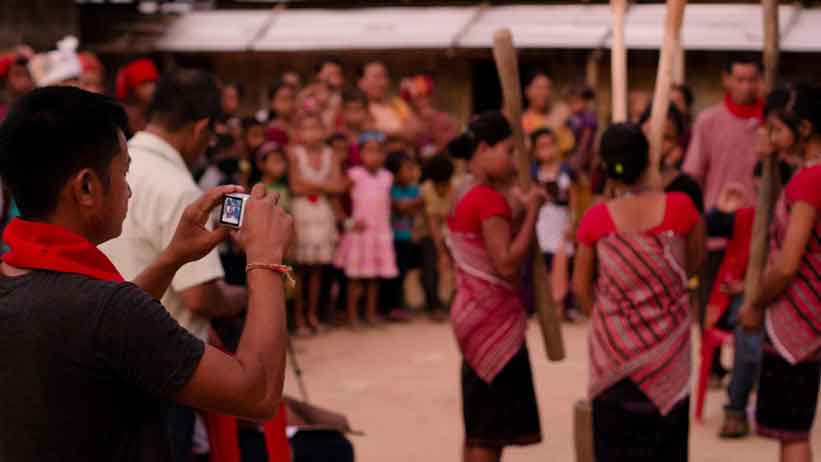The 2014 Hutton Lectures were held on the 3rd and 4th of December beginning at 8AM at The Heritage (Old D.C. Bungalow), Kohima; a historical space that provides a setting appropriate for the projected size of the audience as and theme. Given the drop in temperatures in December, the Heritage provides the most comfort for scholars and attendees seeking to benefit from scholarly exchange.
Keynote Lecture

The 2014 Hutton Lectures Keynote address was given by Dr Fr Abraham Lotha.
Importance of Material Culture among Contemporary Naga
Convenors:
- Dr. Roland Platz (Ethnological Museum Berlin)
- Dr Vibha Joshi (University of Tuebingen and University of Oxford)
Nearly 90% Naga are now Christian. Conversion to Christianity entailed changes in life style, discontinuation of ancestral religious practices and disregard for material cultural artefacts that directly reflected the ancestral belief systems, particularly in relation to prestige in war (headhunting), wealth and feasts of merit. In this context we are interested in what old artefacts mean to Naga at present time? What meaning does ‘ethnic dress’ have for contemporary Naga youth? How important are older collections of textiles and accessories to present day Naga; are older textiles valued as heritage items? We are interested in the questions: How do Naga like to be presented in western Museums and how does this affect current self-presentation in Nagaland? How important is material culture to the presentation of this identity – ethnic, political, religious, modern?
Roundtable Discussion
After the panel on the importance of material culture, a roundtable discussion was held on the two topics, headhunting and Naga self-representation. Dr Roland Platz and Dr Vibha Joshi are organising an exhibition in 2015 under the aegis of the Humboldt Forum in Berlin on the concept of headhunting among the Naga. Naga objects in the Ethnological Museum Berlin date from the 19th Century and form an important part of the history of ethnographic collections and anthropology. The objects (cloth, jewellery and accessories) in the collection relate to status (both of warrior/head-hunter and wealth) and everyday living (agriculture, weaving, trade, dress). The collection was made at the behest of its first director, Dr Bastian, during the phase of liberal anthropological research in Imperial Germany. Dr Bastian also visited Molung in Naga Hills during this period and met Reverend EW Clark, the first missionary of the American Baptist Mission to the Naga.
Christianity & Ethno-theology: Remaking Social Worlds in Northeast India
Convenor: Dr Arkotong Longkumer (University of Edinburgh)
This panel discussed issues surrounding enlightenment ideals of human agency and their relationship with Christianity in Northeast India. It will investigate how these ideas have travelled, examining some of the challenges that the cross-cultural investigation of Christianity presents.
Anthropology as a ‘secular’ discipline has had a particularly fraught relationship with Christianity, associated with its implicit theological agenda and withWestern Imperialism. But Christianity’s concern for the human subject has refused to subside as it has deliberatedmore on notions of enlightenment, progress, individualism, and agency than any other modern movement. In today’s world,Western values are entering into discourses and practices across the globe due to Christianity’s reach into these regions (Keane 2006), raising vital questions about the cross-fertilisation of ideas. Zomia – highland communities in South and Southeast Asia – provides an opportunity to examine these ideas, with one of the largest concentration of Christians in Asia. Although 19th century Christian missions among the valley Hindu and Buddhist populations largely failed, the expansion of British economic interests at the empire’s mountainous periphery generated renewed interests to ‘enlighten’ and ‘civilise’. As missionaries found these indigenous communities receptive to Christianity, it took on new forms, shaping new identities and vocabularies for human agency, particularly in the form of post-colonial nationalisms. We ask how Christianity unravelled these social worlds that brought about changes to (or ruptured) traditional livelihoods.What new ideas emerged from the interaction between Christianity, with its enlightenment influences, and these indigenous communities? How is Christianity shaping and refashioning these communities within existing nation-states? We invite contributions that address Christianity and questions of human agency with a particular focus on Zomia, while illuminating the value for broader theoretical comparison in the emerging field of the anthropology of Christianity.
Two additional ad-hoc panels were organised around themes drawn from abstracts submitted by scholars currently engaged in sociological research in the region, though priority was given to ethnographers.


